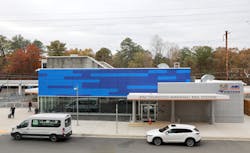MDOT MTA celebrates $4.7-million renovation to BWI Marshall Rail Station
The Maryland Department of Transportation Maryland Transit Administration (MDOT MTA), MDOT Maryland Aviation Administration (MDOT MAA) and Amtrak gathered to officially open the renovated BWI Thurgood Marshall Airport Rail Station serving the MARC Penn Line and Amtrak in Anne Arundel County.
The station’s $4.7-million renovation project is among the array of MDOT transportation investments in recent years.
“At MDOT MTA, we strive every day to enhance our riders’ transit experience,” said MDOT MTA Administrator Kevin Quinn. “The renovated station at BWI Marshall Airport does just that for our MARC Train customers and was accomplished without disrupting rail service.”
Construction for the renovation began in August 2018 and was completed in 14 months. During construction, the station was open for train and bus service using a temporary station with ticketing services, a waiting area and restrooms.
The design of the renovated BWI Marshall Rail Station provides more natural sunlight and includes an expanded seating area with electric charging access for patrons’ phones and computers. New customer-friendly ticketing facilities, options for refreshments and snacks and state-of-the-art restrooms complete the new passenger waiting area. In addition to MARC and Amtrak service, the new facility also serves riders of LocalLink bus route #75, as well as travelers connecting to MDOT MTA Light RailLink at the airport terminal.
“This updated station will welcome travelers from all over the world to Maryland and the Washington, D.C., region and represents MDOT’s commitment to excellent customer service,” said MDOT Secretary Pete K. Rahn.
The BWI Marshall Rail Station project is part of MDOT’s focus to build and maintain a balanced transportation network that broadens connections and provides a variety of up-to-date transportation options.
“This station is an outstanding resource for our passengers, offering quick, easy access to Washington, Baltimore and beyond,” said Ricky Smith, executive director of BWI Marshall Airport.
Other recent and substantial investments in transit options for the region include $61 million for eight modern and more powerful MARC locomotives; $160 million for 53 new Light RailLink vehicles; $98 million for 172 low-emission clean-diesel buses; and $450 million for 78 new Metro SubwayLink cars, slated to be in service by 2022.
